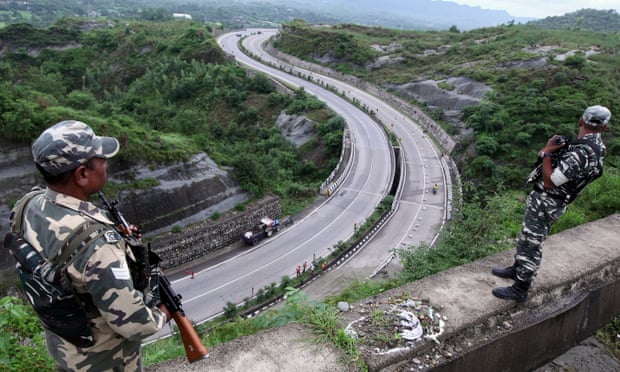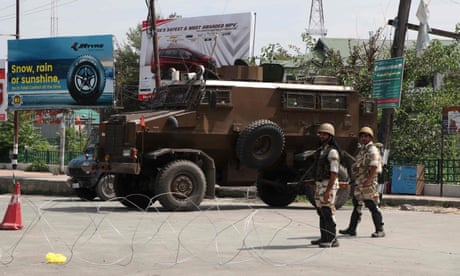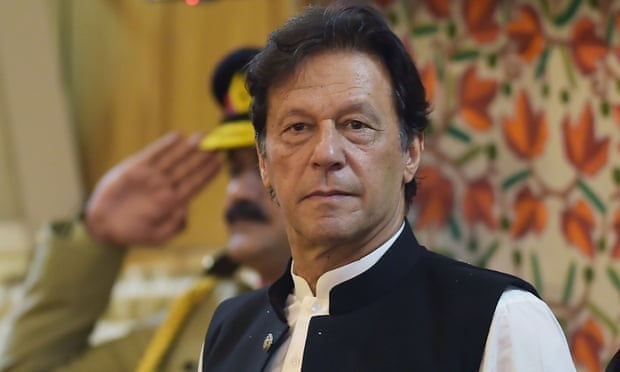Pakistan PM says army is preparing to respond to anticipated Indian aggression in region
Rebecca Ratcliffe in Delhi Wed 14 Aug 2019

Pakistan’s prime minister, Imran Khan, has threatened to “teach Delhi a lesson” and vowed to fight until the end against any Indian violations in disputed Kashmir.
In some of his strongest words since Delhi revoked Indian-administered Kashmir’s special status last week, Khan said the army was preparing to respond to anticipated Indian aggression in Pakistan-administered Kashmir.
“The Pakistani army has solid information that they [India] are planning to do something in Pakistani Kashmir, and they are ready and will give a solid response,” Khan said.
“We have decided that if India commits any type of violation we will fight until the end,” Khan said during a visit to Muzaffarabad, the capital of Pakistan-administered Kashmir, in a speech marking Pakistan’s independence day.
“The time has arrived to teach you a lesson,” he said.
Pakistan, which also claims Kashmir and has fought wars with India over the region, responded furiously to Delhi’s decision last week to revoke Indian-administered Kashmir’s special status. It compared the Indian government to Nazis and suggested they might carry out ethnic cleansing.
Kashmir
Who controls Kashmir?
The region in the foothills of the Himalayas has been under dispute since India and Pakistan came into being in 1947.
Both claim it in full, but each controls a section of the territory, separated by one of the world’s most heavily militarised borders: the ‘line of control’ based on a ceasefire border established after a 1947-48 war. China controls another part in the east.
India and Pakistan have gone to war a further two times over Kashmir, most recently in 1999. Artillery, mortar and small arms fire are still frequently exchanged.
How did the dispute start?
After the partition of colonial India in 1947, small, semi-autonomous ‘princely states’ across the subcontinent were being folded into India or Pakistan. The ruler of Kashmir dithered over which to join until tribal fighters entered from Pakistan intent on taking the region for Islamabad.
Kashmir asked Delhi for assistance, signing a treaty of accession in exchange for the intervention of Indian troops, who fought the Pakistanis to the modern-day line of control.
In 1948, the UN security council called for a referendum in Kashmir to determine which country the region would join or whether it would become an independent state. The referendum has never been held.
In its 1950 constitution, India granted Kashmir a large measure of independence. But since then it has eroded some of that autonomy and repeatedly intervened to rig elections and dismiss and jail democratically elected leaders.What is Kashmir’s special status?
Kashmir’s special status, given in exchange for joining the Indian union, has been in place since 14 May 1954. Under article 370, the state was given a separate constitution, a flag, and autonomy over all matters except for foreign affairs and defence.
An additional provision, article 35a, prevented people from outside the state buying land in the territory. Many Kashmiris believed this was crucial to protecting the demography of the Muslim-majority state and its way of life.
The ruling Bharatiya Janata party repeatedly promised to scrap such rules, a long-term demand of its Hindu nationalist support base. But analysts warned doing so would almost certainly ignite unrest.
On Monday 5 August 2019, the government issued a presidential order to abolish Kashmir’s special status. The government argued that the provision was only intended to be temporary and that scrapping it would boost investment in Kashmir. Critics, however, said the move would escalate tensions with Pakistan – which quickly called India’s actions illegal – and fuel resentment in Kashmir, where there is an insurgency against Indian rule.
There has been an armed insurgency against Indian rule over its section of Kashmir for the past three decades. Indian soldiers and Pakistan-backed guerrillas fought a war rife with accusations of torture, forced disappearances and extra-judicial killing.
Until 2004, the militancy was made up largely of Pakistani and Afghan fighters. Since then, especially after protests were quashed with extreme force in 2016, locals have made up a growing share of the anti-India fighters.
For Indians, control of Kashmir – part of the country’s only Muslim-majority state – has been proof of its commitment to religious pluralism. For Pakistan, a state founded as a homeland for south Asian Muslims, it is the last occupied home of its co-religionists.
Pakistan’s foreign ministry said on Wednesday that it had asked the UN security council for an urgent meeting on the matter, while Khan has previously vowed to lobby heads of state over what he says are illegal actions by the Indian government. The response by other global powers has so far been muted.
Millions of people in Indian-administered Kashmir remain without landlines, mobiles or internet access, 10 days after an unprecedented blackout imposed hours before India made its announcement.
The territory will remain under a curfew on Thursday as India marks its independence day, a date usually accompanied by protests.
Local media reported some restrictions would be eased after Thursday, but said the communications shutdown would stay in place.

Delhi’s decision strips the disputed state of Kashmir and Jammu of any elements of autonomy, removing its constitution and flag, and scrapping laws that prevented outsiders from buying land. The state will also be split in two.
It is the most radical change in Kashmir since the region joined the Indian union, and many Kashmiris fear it will alter the demography of what is the country’s only Muslim-majority state.
“It’s an existential battle now,” the Kashmiri politician Shah Faesal told the Guardian on Tuesday. He was reportedly detained at Delhi airport on Wednesday.

Other high-profile politicians, including Omar Abdullah, the scion of a prominent political family in Kashmir, and a former chief minister in the state, were arrested last week.Advertisement
Faesal said Delhi’s actions were “an insult to the dignity of the people”, adding: “My belief is that it will have immediate and long-term consequences. We will see ground mobilisation in the coming days and in the long run you will have sentiment of alienation going further and [it will] erupt.”
He continued: “The common refrain is that everything has finished. Everything has been snatched from us. These are the common lines on every Kashmiri’s lips these days. We have no choice left but to resist.”
Faesal was previously held up as an example of how Kashmiris could succeed in India’s mainstream. He left the Indian administrative service this year to launch a political party, the Jammu and Kashmir People’s Movement (JKPM).
Delhi’s actions had destroyed any remaining trust in mainstream politics, he said. “Anybody who used to promote the idea that it is possible to have a future with India – all those people are discredited today.”
Governments around the world have used internet blackouts, or blocked popular platforms such as WhatsApp, at times of political crisis. Several countries have also used temporary outages to try to foil cheats in national exams. The controls India has put on communications in Kashmir – blocking phone lines and the internet, and limiting travel to the region – have created a rare degree of isolation.
Netblocks monitors outages worldwide, and has recorded dozens of cases this year alone. But it is rare for all communication, including phone lines, to be severed. Other countries that have limited their citizens’ communications, both temporarily and long-term, in recent years include:
About 500 people have reportedly been arrested since the security clampdown began, apparently to prevent disorder. Despite strict curfews and a heavy paramilitary presence, 10,000 people protested on the streets of Kashmir’s main city, Srinagar, last week when the curfew was briefly lifted for Friday prayers.
India has said the protests were not representative of all people’s opinions, and has downplayed demonstrations, initially suggesting no more than 20 people were involved. BBC footage appeared to show huge crowds on the streets.
The communications blackout and restrictions on movement mean there is a lack of independent information about what is happening in Kashmir. Satya Pal Malik, the state governor, told the Times of India the severing of communications was to prevent unrest.
“We don’t want to give that instrument to the enemy until things settle down,” he said. “In a week or 10 days, everything will be all right and we will gradually open lines of communication.”
Agence France-Presse contributed to this report
